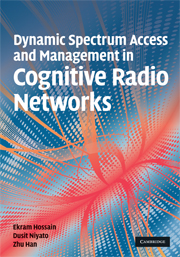Book contents
- Frontmatter
- Contents
- Preface
- Part I Introduction
- Part II Techniques for design, analysis, and optimization of dynamic spectrum access and management
- Part III Dynamic spectrum access and management
- 7 Dynamic spectrum access: models, architectures, and control
- 8 Centralized dynamic spectrum access
- 9 Distributed dynamic spectrum access: cooperative and non-cooperative approaches
- 10 Distributed dynamic spectrum access: learning algorithms and protocols
- 11 Economics of dynamic spectrum access: spectrum trading
- 12 Economics of dynamic spectrum access: applications of spectrum trading models
- References
- Index
10 - Distributed dynamic spectrum access: learning algorithms and protocols
from Part III - Dynamic spectrum access and management
Published online by Cambridge University Press: 26 February 2010
- Frontmatter
- Contents
- Preface
- Part I Introduction
- Part II Techniques for design, analysis, and optimization of dynamic spectrum access and management
- Part III Dynamic spectrum access and management
- 7 Dynamic spectrum access: models, architectures, and control
- 8 Centralized dynamic spectrum access
- 9 Distributed dynamic spectrum access: cooperative and non-cooperative approaches
- 10 Distributed dynamic spectrum access: learning algorithms and protocols
- 11 Economics of dynamic spectrum access: spectrum trading
- 12 Economics of dynamic spectrum access: applications of spectrum trading models
- References
- Index
Summary
Learning algorithms are used to build knowledge about a cognitive radio network so that the cognitive radio users can dynamically adapt their decisions on spectrum access. Learning algorithms are useful for cognitive radio networks with either collaborative or non-collaborative behavior among the network entities. In a non-collaborative scenario, there is no exchange of information in the network and a cognitive radio user has to learn from the local observations only. This chapter deals with learning-based schemes for distributed dynamic spectrum access. Different protocols to support distributed dynamic spectrum access are also discussed. These protocols can be used to facilitate spectrum handoff, exchange the information between cognitive radio users, and synchronize the transmission between cognitive radio transmitter and receiver.
Learning-based distributed dynamic spectrum access
Distributed resource management in multihop cognitive radio networks
In a multihop cognitive radio network, the channel selection algorithm plays an important role in optimizing the transmission performance and avoiding interference. To achieve an optimal channel selection, information of the channel availability is required at each node. Although an information exchange mechanism can be developed for this channel selection algorithm, this can incur a significant cost in the system. This information exchange not only reduces the available resources for data transmission, but also increases the delay of data transmission. Therefore, with the constraint of available information in a multihop cognitive radio network, a distributed minimum delay routing and channel selection algorithm based on learning was proposed for delay-sensitive traffic (e.g. multimedia) [540].
In the system model, there are multiple licensed users occupying the channels. In this multihop cognitive radio network, the licensed users require an interference-free environment.
- Type
- Chapter
- Information
- Publisher: Cambridge University PressPrint publication year: 2009



